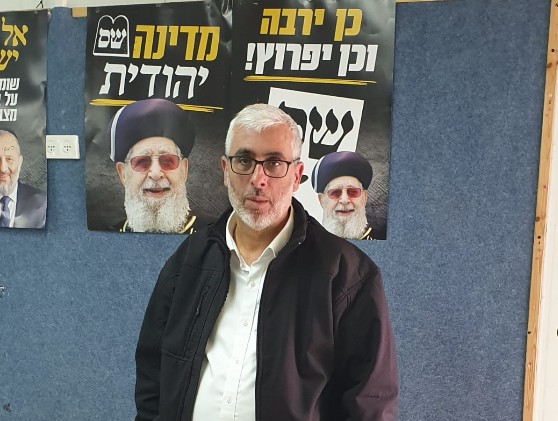Tiberias After Ron Kobi: "The City is Finally Functioning Again"
A city council member, journalist, and residents describe Tiberias' low points under Ron Kobi's tenure and the transformation after his dismissal as mayor.
 Kobi (Photo: David Cohen/Flash90)
Kobi (Photo: David Cohen/Flash90)Former Tiberias city council member, Pinchas Vaknin, is one of the few people in Israel who worked over the past year to ensure his own removal from office. "It was worth leaving my position as a city council member in Tiberias," reveals Vaknin, who was ousted from his role following the dissolution of the municipality by the Ministry of Interior, after the majority of the council members refused to approve the annual budget submitted by the mayor.
Vaknin was part of a group of eight council members working together to remove Ron Kobi from the mayor's office. They knew that their efforts would result in their own dismissal but preferred to leave their positions rather than keep the city under Kobi’s control.
Vaknin, a long-serving member from 'Agudath Israel', explains that Ron Kobi was mistakenly elected as mayor. "His voters expected to see a man of action who would uplift the city. They chose him because that was the image he portrayed during his previous campaign for the mayoralty. At that time, he gave the previous mayor a hard time by highlighting various faults in the city, thus drawing attention to them, and the city indeed took action to correct the problems he pointed out. This struggle gave part of the public the impression that Kobi was a man of action, capable of better handling the city's structural problems. His voters believed that once he became mayor, Tiberias would begin to function. Only after his election did everyone realize—including the vast majority who voted for him—that he was totally unsuited for the role.
Shimon Cohen, a well-known journalist and social activist in Tiberias, recounts the moments he realized Ron Kobi's appointment would harm the city and its residents. "Initially, I hoped to cooperate with him," Cohen says. "I tried to come to terms with his election, but from the first moment we met, I understood that he was a person interested in problems, not solutions. He accused me of recording him and cut off contact with me." Since that meeting, the relationship between Kobi and Cohen only worsened. "If you expect a mayor to focus on the city's problems, Ron Kobi was different. He invested all his energy in conflicts. Whenever I approached the area where he was, he would drop everything to focus on me, recording and filming, and then he would file a complaint with the police," Cohen describes.
"During his time as mayor, he constantly clashed with people. That’s what he was focused on," agrees Pinchas Vaknin. "Instead of tending to the city, he protested against the former mayor who moved to the Lower Galilee, to present to the residents a facade of a fight against corruption, as he claimed that the former mayor operated questionably. Meanwhile, the city was neglected under his watch. From his first speech, he began to incite against everyone: against the opposition, against the ultra-Orthodox, and against all his opponents. The council members, who expected a statesman-like conduct from a victor, were surprised to find a person whose sole interest was in confrontation."
 Pinchas Vaknin (Photo: Personal album)
Pinchas Vaknin (Photo: Personal album)
"Kobi Set Tiberias Back 20 Years"
"Under Ron Kobi's mayoralty, the city simply did not function," describes Vaknin. "He didn’t promote the city in any way; he just set it back 20 years. All the hopes people had that the city would grow and thrive during his term faded shortly after his election. Kobi addressed none of the city's needs, channeling all his energy into publicity and exposure. He was constantly giving interviews, running from studio to studio."
According to the Tiberian residents we spoke to, the problematic management of the municipality led to "the corresponding results," as they put it. "The city simply didn't function. The anger and disagreements disrupted the city’s regular administration. Ron Kobi was not looking for cooperation, and Tiberias was led this past year by someone unworthy and unfitting, who doesn't even reside in the city, with his sole aim being to stir up trouble and become famous. "The price was paid by us, the residents," they add with pain.
Kobi's failure to communicate with the various bodies with which he should have coordinated to manage the city was at the root of his dysfunction. Vaknin notes that besides not collaborating with most council members, his conduct with government ministries and professional levels was also highly problematic, resulting in Tiberias receiving nearly no government budgets during his term. According to him, "Ron Kobi quarreled with parliament members from all parties and with the Ministry of Interior. As is known, a municipality cannot function without the cooperation of the Ministry of Interior. Through his conduct with those around him and government ministries, Kobi severely harmed Tiberias and its residents. He fought against the professional elements at the Ministry of Interior—from the director-general to the district supervisor appointed by the ministry. For years, they had collaborated and transferred budgets until Kobi arrived and they halted everything, and they’re not even ultra-Orthodox," notes Vaknin.
It was clear to everyone that this saga needed to end, and soon. Surprisingly, Ron Kobi himself aided in his own downfall. "Just like we see in the weekly Torah portion, where Hashem hardened Pharaoh's heart to show him His signs, it was similarly with Kobi, who amazingly, after campaigning and persecuting the ultra-Orthodox community and every Jewish symbol on his way to the mayoralty, and even after, was unable to form a coalition and was removed from office," says Vaknin, explaining: "He had six council members from his side. No mayor in Tiberias in recent years had been elected with so many council members. He needed just two more council members to form a functioning coalition. At a certain point, an additional council member defected to his side. Ron Kobi was just one council member short of solidifying his coalition, but he could not achieve this. No one believed in him. He would offer generous proposals to council members to vote in favor of the budget approval, but it was clear to everyone that the moment they voted with him for the budget's approval and his other plans, he would not keep his promises."
According to Shimon Cohen, Kobi, in a miraculous way, united everyone against him. "He needed only one council member, but chose to fight everyone, calling people ‘angels of destruction.’ With this approach, it's no wonder he lost much support. Those who did support him were just a few marginal figures from the city. Everyone else left him, including his close advisors and initial supporters."
 Shimon Cohen
Shimon Cohen
Religious-Secular Relations Have Returned to Normal
The tone set by Ron Kobi during his time as mayor infiltrated the streets. His continuous incitement found a place among some residents, creating a certain rift between communities. All this thanks to one man — a politician seeking fame and glory.
"This incitement had no basis to begin with," explains Shimon Cohen. "Tiberias is a city where everyone lives together. There are no clashes or disputes. Everyone behaves in their way and according to their beliefs. Even Kobi's initiative for public transportation on Shabbat failed due to lack of demand. People simply didn't need it. Despite the public relations campaign for the initiative in the media and Kobi himself riding the bus to encourage the residents to join in the violation of Shabbat, the initiative didn’t take off, and after one or two instances, the Shabbat transport ceased."
When asked if he sees a difference in the relationship between religious and secular residents now compared to Kobi's time as mayor, Cohen replies: "Certainly. At first, there was simply fear of walking around the city. The media was against us, and harsh words were thrown at us. Today, there's calm and tranquility; the city has become peaceful. The brotherhood that existed between the religious and secular has returned."
Vaknin also notices a change in the atmosphere towards the ultra-Orthodox community: "Removing Kobi from office helped foster proper relations between the city's different sectors. When the city leader aims only to create friction between communities, the situation on the ground becomes problematic. It's true there's natural tension, but it can either be amplified or subdued. Kobi caused controversy and disputes, and people spoke harshly against the religious public; now, you don't hear that."
Now, all this is history. Ron Kobi was removed by the Ministry of Interior, and Tiberias is now managed by a government-appointed committee. The committee includes several members, with each responsible for a different aspect of municipal functioning. This committee is warmly received by the city's residents, who hope that its members will manage to repair the damage Kobi inflicted on Tiberias. According to Cohen, "This is an external committee not connected to anyone in Tiberias, so everyone understands that the committee's actions are done with an objective approach and a goal to improve the city, and the results show this." Vaknin notes that the change is also visible on the faces of municipal employees, who were disheartened during Kobi's control of the city and now have regained their vitality.
Meanwhile, former council member Yitzhak Vaknin is adjusting to his new status as a regular citizen. "I have different pursuits now. I'm focusing more on my family and planning for the future," Vaknin says and concludes, "In the past year, we've clearly seen how Hashem runs the world: Kobi acted against Shabbat, the Torah, and the rabbis, and divinely, despite only missing one mandate, and despite all efforts, he was unable to finally form the coalition he wanted."

